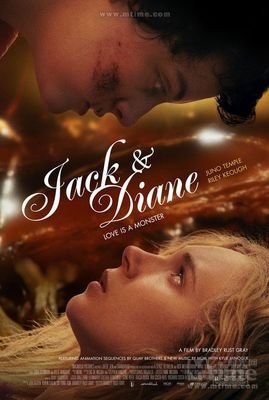《杰克与黛安》影评摘抄
《杰克与黛安》是一部由Bradley Rust Gray执导,朱诺·坦普尔 / 凯莉·米洛 / 丽莉·克亚芙主演的一部剧情 / 爱情 / 恐怖 / 同性类型的电影,特精心从网络上整理的一些观众的影评,希望对大家能有帮助。
《杰克与黛安》精选点评:
●我家吉娜马隆呢我就想问一句?????
●小T我喜欢!
●WTF那个脏兮兮的怪物还有人体组织到底想说明什么啊!白瞎了only you这首歌了
●要死啊 什么鬼东西 要不是为了看脸 生命的千分之一就这么没了
●要是是ellen page演该多好,,,,
●好久没看过这么难看的电影了,全片不知所云,还TM变狼人了是JB怎么回事。好好拍个谈恋爱故事很难么,两个人稀里糊涂地神游了俩小时。女主角不好看怪怪的,小T还算能看。
●孩子的想象力
●神翻译 俩女主一人一颗星
●本来好好的 导演你犯什么神经病
●Riley Keough 好帅! 颜简直无敌,扮男帅,女的美!片子好离奇没看懂
《杰克与黛安》影评(一):杰克和戴安
有人觉得怪兽很恶心出现的也有点突兀,我个人觉得怪兽的出现只是个隐喻——情欲的象征,你会发现怪兽只会在主角流很多鼻血以后出现,或是在俩人做亲密动作的时候才会闪现那些画面。
除去一开始女主跟她sister走丢在厕所的那段外,戴安在第一次看到杰克一见钟情的时候流了鼻血,还有在酒吧杰克跟戴安表白那次,戴安再次流了鼻血。
到后来杰克和戴安××00后,杰克也开始流鼻血以及戴安在梦境中自己化身怪兽,然后在地下室黑暗中,杰克说自己又流鼻血了,我觉得这是杰克彻底陷入情网的另一种隐喻,你会发现在教堂里杰克把自己最后一块糖给了戴安,而在此之前的一次戴安同样是讨要最后一块糖杰克就没给。
地下室里,因为恐惧和担忧杰克,情绪在顶点爆发时,闪光灯突然照亮的同时戴安幻想看到怪兽,这也可以被认为是戴安将流着鼻血的杰克幻想成怪兽。
个人蛮喜欢主角的装扮和环境配音协调呈现的那种明朗鲜艳和怀旧散漫温柔舒缓的感觉,戴安在床上表现的痛苦矛盾以及怪兽出现的梦境中时,配音则给人诡异恐怖和浮躁不安的感觉,当然影片中充斥了很多环境音也是它给人如此强烈的真实感的重要因素之一。
《杰克与黛安》影评(二):IMDb上的评论.. 于是我就没有再看下去
User Reviews
ure crap!
21 May 2013 | by deboraey (Edegem Belgium) – See all my reviews
This movie is indeed pure pure crap and no more!
All the fuzz as for instance that the monster we saw - and also the meaningless images of some kind of living tissue and hair growing around it - is a metaphor for Diane's sexual feelings and how they increase . . and burst . . . come on give me a break folks! This isn't even a love story . . it's the story of two kind of weird teenagers meeting and spending time together exploring each other and nag and whine all the time . . pf . . I really don't see the point of this movie. . .
Why not make a decent lesbian movie for a wide audience instead of this piece of crap . . . it's beyond me!
《杰克与黛安》影评(三):诚实+大胆=没人爱
Think most people who really give this film a chance will see how incredible Bradley Rust Gray's work with his actors & his scenario really is: vulnerable, realistic, mumblecore-ish performances framed and followed with naturalistic camerawork, with scarcely any directorial punctuations (save the obvious one, which I'll get to later), all in service of a script that could easily veer into indie clicheland (but it doesn't, it really doesn't). What I want to do is offer a defense of the werewolf device that everyone seems to hate or find more annoying than essential.
1.) Going into this movie cold, I had literally almost no idea what that monster could be. Only after reading some reviews did it make sense to me, but our werewolf lacks anything popular culture would deem necessary as signification: no moon, no howling, no transformation. It's evident that this is a metaphor, like a lot of the things in this film: the bruise, the siblings, the parents (it seems everything outside of a close-up or a two-shot will probably have some thematic purpose in this film). What's also evident is how fucking intrusive this particular metaphor is--it is essentially abstraction incarnate, an inorganic element plopped into a film that is desperately organic & physical (sex looms huge, a razor gets near a vagina, people eat sushi with ketchup [EW!!!], a lot [A LOT] of pooping). This element is unspecific and distracting, and as a metaphor seems inelegant.
2.) This is not a bad thing. Without the disruptions the incessant harmony of this film would nauseate--Gray has so much empathy and patience for this fragile couple that a forceful harmony always asserts itself whenever they're in frame. Intimacy rules our lovers and removes the outside world: love is true & real...but is it good? Is it sustainable? The answer of course is no; this is a film in which a successful meetcute logically invites a casual carcrash; where a fireball eating scene goes on so long that a passerby finds himself trapped in an alien world; where our lovers turn into werewolves. It is more honest than just a depiction of romance and connection (Lost in Translation comes to mind); it has the audacity to assert an emotional connection and disrupt it with an erotic disconnect, an icky squicky Cronenbergian body-horror metaphor.
3.) Which makes the ending all the more interesting--clearly there is harmony in the shot, with Diane finding a rare moment of synchronicity with music & diegetic sound (throughout the film the languor of conversation runs in discord with the rhythmic music Gray chooses to layer around scenes). But one remembers the last shot of Jack, a frustrating long take of her back, which is preceded by a misdirecting sound cue (no, she is not in Paris). Clearly this is a film about falling in love, being in love; but perhaps it is most poignant and unnerving when dealing with not falling out of but losing love, of being just one half.
